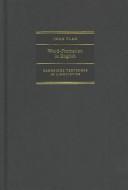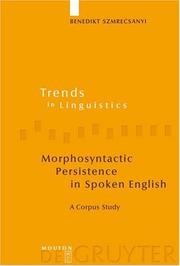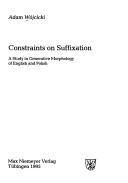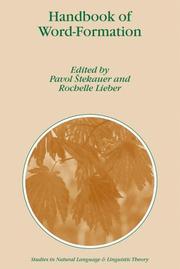| Listing 1 - 10 of 10 |
Sort by
|
Book
ISBN: 9780198747062 Year: 2015 Publisher: Oxford Oxford university press
Abstract | Keywords | Export | Availability | Bookmark
 Loading...
Loading...Choose an application
- Reference Manager
- EndNote
- RefWorks (Direct export to RefWorks)
802.0-55 --- 802.0-55 Engels: morfologie --- Engels: morfologie --- English language --- Morphology.

ISBN: 0582239648 9780582239647 Year: 2001 Publisher: Harlow Pearson
Abstract | Keywords | Export | Availability | Bookmark
 Loading...
Loading...Choose an application
- Reference Manager
- EndNote
- RefWorks (Direct export to RefWorks)
English language --- Word formation --- Syntax --- 802.0-55 --- -English language --- -Germanic languages --- Engels: morfologie --- -Engels: morfologie --- 802.0-55 Engels: morfologie --- -802.0-55 Engels: morfologie --- Germanic languages --- English language - Word formation --- English language - Syntax --- -Word formation

ISBN: 0521819598 0521525632 1316099164 1107135826 0511078439 0511561911 0511841329 0511203594 051107686X 9780521525633 9780511078439 9780511076862 9780511841323 9780511561917 9780521819596 Year: 2003 Volume: *52 Publisher: Cambridge Cambridge University press
Abstract | Keywords | Export | Availability | Bookmark
 Loading...
Loading...Choose an application
- Reference Manager
- EndNote
- RefWorks (Direct export to RefWorks)
This textbook provides an accessible introduction to the study of word-formation, focussing specifically on English. Complex words have an internal structure consisting of two or more meaningful elements, or morphemes. As well as combining to create words, these elements can function both to relate words to other words, and to create new words. Assuming no prior Linguistic knowledge, Ingo Plag takes students through the fundamentals of word-formation, encouraging them to engage in their own morphological analyses of English words. After working with this book, readers should be familiar with the necessary methodological tools to obtain relevant data (corpora, various types of dictionaries, experiments, internet resources), and should be able to systematically analyse their data and relate their findings to theoretical problems and debates. Drawing on insights from various research traditions - rather than just one theoretical perspective - Word-Formation in English will be welcomed by all students of English Language and Linguistics.
English language --- Word formation. --- Word formation --- 802.0-55 --- 802.0-55 Engels: morfologie --- Engels: morfologie --- Arts and Humanities --- Language & Linguistics --- Germanic languages --- English language - Word formation --- Grammar
Book
ISBN: 9789027205858 Year: 2010 Volume: 118 Publisher: Amsterdam ; Philadelphia John Benjamins Publishing Company
Abstract | Keywords | Export | Availability | Bookmark
 Loading...
Loading...Choose an application
- Reference Manager
- EndNote
- RefWorks (Direct export to RefWorks)
802.0-55 --- Engels: morfologie --- 802.0-55 Engels: morfologie --- English language --- Suffixes and prefixes --- Word formation --- Morphology --- Prefixes --- Germanic languages
Book
ISBN: 9780199579266 0199579261 Year: 2013 Publisher: Oxford Oxford university press
Abstract | Keywords | Export | Availability | Bookmark
 Loading...
Loading...Choose an application
- Reference Manager
- EndNote
- RefWorks (Direct export to RefWorks)
English language --- Grammar --- Grammar, Comparative and general --- Morphology --- Word formation --- 802.0-55 --- Engels: morfologie --- 802.0-55 Engels: morfologie --- Grammar, Comparative and general - Morphology --- Grammar, Comparative and general - Morphology - Terminology --- Grammar, Comparative and general - Word formation --- English language - Morphology
Book
ISBN: 9780521884976 0521884977 9780511576539 9781107407695 9780511517938 0511517939 9780511515460 0511515464 0511576536 1107200431 9786612103889 0511514395 0511516746 1107407699 9781107200432 6612103884 9780511514395 9780511516740 9781282103887 1282103881 9780511517440 0511517440 Year: 2009 Publisher: Cambridge Cambridge university press
Abstract | Keywords | Export | Availability | Bookmark
 Loading...
Loading...Choose an application
- Reference Manager
- EndNote
- RefWorks (Direct export to RefWorks)
Where do dialects differ from Standard English, and why are they so remarkably resilient? This study argues that commonly used verbs that deviate from Standard English for the most part have a long pedigree. Analysing the language use of over 120 dialect speakers, Lieselotte Anderwald demonstrates that not only are speakers justified historically in using these verbs, systematically these non-standard forms actually make more sense. By constituting a simpler system, they are generally more economical than their Standard English counterparts. Drawing on data collected from the Freiburg English Dialect Corpus (FRED), this innovative and engaging study will be of great interest to students and researchers of English language and linguistics, morphology and syntax.
Dialectology --- Grammar --- English language --- 802.0-087 --- 802.0-55 --- 802.0-55 Engels: morfologie --- Engels: morfologie --- 802.0-087 Engels: dialecten --- Engels: dialecten --- Dialects --- Verb --- Conjugation --- Periphrastic verbs --- Verb phrase --- Verb. --- Arts and Humanities --- Language & Linguistics --- Germanic languages
Book
ISBN: 9780198712374 9780198712367 0198712375 Year: 2014 Publisher: Oxford: Oxford university press,
Abstract | Keywords | Export | Availability | Bookmark
 Loading...
Loading...Choose an application
- Reference Manager
- EndNote
- RefWorks (Direct export to RefWorks)
A detailed study of around 200 English prefixes and suffixes. Each affix is discussed in detail, with information on its origin, phonological form, stress placement, semantic range, and the roots it can be attached to.
Lexicology. Semantics --- English language --- Grammar --- Suffixes and prefixes --- New words --- Morphology --- 802.0-55 --- 802.0-5 --- Engels: morfologie --- Engels: grammatica --- 802.0-5 Engels: grammatica --- 802.0-55 Engels: morfologie --- Words, New --- English --- Prefixes --- Germanic languages --- English language New words --- English language - Suffixes and prefixes --- English language - New words --- English language - Morphology

ISBN: 128219416X 9786612194160 3110197804 3110190125 9783110190120 9783110197808 Year: 2006 Volume: 177 Publisher: Berlin Mouton de Gruyter
Abstract | Keywords | Export | Availability | Bookmark
 Loading...
Loading...Choose an application
- Reference Manager
- EndNote
- RefWorks (Direct export to RefWorks)
Language users are creatures of habit with a tendency to re-use morphosyntactic material that they have produced or heard before. In other words, linguistic patterns and tokens, once used, persist in discourse. The present book is the first large-scale corpus analysis to explore the determinants of this persistence, drawing on regression analyses of a variety of functional, discourse-functional, cognitive, psycholinguistic, and external factors. The case studies investigated include the alternation between synthetic and analytic comparatives, between the s-genitive and the of-genitive, between gerundial and infinitival complementation, particle placement, and future marker choice in a number of corpora sampling different spoken registers and geographical varieties of English. Providing a probabilistic framework for examining the ways in which persistence - among several other internal and external factors - influences speakers' linguistic choices, the book departs from most writings in the field in that it seeks to bridge several research traditions. While it is concerned, in a classically variationist spirit, with internal and external determinants of grammatical variation in English, it also draws heavily on ideas and evidence developed by psycholinguists and discourse analysts. In seeking to construct a comprehensive model of how speakers make linguistic choices, the study ultimately contributes to a theory of how spoken language works. The book is of interest to graduate students and researchers in variationist sociolinguistics, probabilistic linguistics, psycholinguistics, and computational linguistics.
English language --- Morphology. --- Syntax. --- Discourse analysis. --- Grammar. --- Variation. --- Pragmatics --- Grammar --- Dialectology --- 802.0-55 --- 802.0-56 --- 802.0-56 Engels: syntaxis; semantiek --- Engels: syntaxis; semantiek --- 802.0-55 Engels: morfologie --- Engels: morfologie --- Anglais (Langue) --- Morphologie --- Syntaxe --- Analyse du discours --- Grammaire --- Variation --- Analysis and parsing --- Diagraming --- Discourse analysis --- Morphology --- Syntax --- Dialects --- Composition and exercises --- Germanic languages --- Corpora. --- English/language. --- sociolinguistics.

ISBN: 3484303409 3110958899 9783110958898 Year: 2015 Volume: 340 Publisher: Tübingen
Abstract | Keywords | Export | Availability | Bookmark
 Loading...
Loading...Choose an application
- Reference Manager
- EndNote
- RefWorks (Direct export to RefWorks)
The book is a generative study of a number of English and Polish processes of suffixation. It focuses on various constraints on such processes. The allomorphy of English inflection is shown to follow from language-specific constraints on syllable structure. English derivational suffixes are shown to be crucially sensitive to the morphological make up of their bases - the majority fails to attach to a suffixed stem, while the rest attaches to a well-defined subset of all suffixed stems. Thus some major tenets of the current mainstream generative theory of the lexicon (Affix Ordering Generalization and Bracket Erasure Convention) are called into question. A detailed discussion of verbalizing processes of contemporary Polish reveals that rules of suffixation are subject to constraints on their bases the proper formulation of which specially involves the distinction root/stem. Markedly distinct characteristics of root-based and stem-based morphological rules are thoroughly discussed. The productive deverbal morpholocial processes in Polish are shown to require access to more than one component formative in the base, which seriously undermines some constraints advanced in the literature (Adjacency condition, Atom condition).
802.0-55 --- Engels: morfologie --- 802.0-55 Engels: morfologie --- Polish language --- English language --- Generative grammar. --- Grammar, Comparative and general --- Morphology (Linguistics) --- Grammar, Generative --- Grammar, Transformational --- Grammar, Transformational generative --- Transformational generative grammar --- Transformational grammar --- Psycholinguistics --- Suffixes and prefixes. --- Morphology. --- Derivation --- Prefixes --- Suffixes and prefixes --- Generative grammar --- Linguistics --- Philology --- Germanic languages --- Grammar, Comparative and general Morphology --- Morphology

ISBN: 1402035950 1402035977 9786610283989 128028398X 1402035969 9781402035975 9781402035951 Year: 2005 Publisher: Dordrecht Springer
Abstract | Keywords | Export | Availability | Bookmark
 Loading...
Loading...Choose an application
- Reference Manager
- EndNote
- RefWorks (Direct export to RefWorks)
Grammar, Comparative and general --- Morphology. --- Word formation. --- 801.55 --- 802.0-55 --- Morphology (Linguistics) --- Derivational morphology --- Word formation --- 802.0-55 Engels: morfologie --- Engels: morfologie --- 801.55 Morfologie--(taalkunde) --- Morfologie--(taalkunde) --- Morphology --- Derivation --- Lexicology. Semantics --- Grammar --- Linguistics --- Philology --- Grammar, Comparative and general Morphology
| Listing 1 - 10 of 10 |
Sort by
|

 Search
Search Feedback
Feedback About UniCat
About UniCat  Help
Help News
News